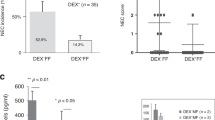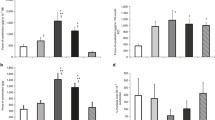Abstract
Maternal administration of corticosteroids is thought to decrease the incidence of necrotizing enterocolitis in premature infants. To determine if this protection is mediated by mucosal stabilization, we tested the effect of prenatal and postnatal steroids in a model of subclinical ischemia-reperfusion injury in immature rats. Ten-day and 6-week-old rats were subjected to superior mesenteric artery occlusion for 10 min or to sham operation. Ileal mucosal permeability to labelled chromium EDTA (51CrEDTA) was assessed 30 min after reperfusion. Animals received 3 mg/kg betamethasone, 50 mg/kg hydrocortisone, 2 mg/kg dexamethasone, or saline for 3 days prior to the experiment and at the time of laparotomy. To test the effect of prenatal steroid administration, pregnant rats were treated with betamethasone, dexamethasone, or saline daily for 3 days prior to term delivery. Permeability was then tested in the newborns at 10 days of age. Ten-minute occlusion resulted in a significant increase in permeability to 51CrEDTA in all animals. There was no significant attenuation of the ischemia-reperfusion-induced permeability increase by any steroid at either age or by prenatally administered steroids. We conclude that protective mechanisms other than mucosal stabilization, such as decreased neutrophil infiltration or inhibition of inflammatory mediators, must therefore be postulated and tested.
Similar content being viewed by others
References
Anderson GG, Lamden M, Cidlowski JA, Ashikaga T (1981) Comparative pulmonary surfactant-inducing effect of three corticosteroids in the near-term rat. Am J Obstet Gynecol 139: 562–564
Barks JDE, Post M, Tuor UI (1991) Dexamethasone prevents hypoxic-ischemic brain damage in the neonatal rat. Pediatr Res 29: 558–563
Bauer CR, Morrison JC, Poole WK, Korones SB, Boehm JJ, Rigatto H, Zachman RD (1984) A decreased incidence of necrotizing enterocolitis after renatal glucocorticoid therapy. Pediatrics 73: 682–688
Beaulieu J-F, Calvert R (1987) Hormonal regulation of epithelial cell proliferation in the fetal mouse duodenum in vitro. Anat Rec 217: 250–255
Brauler JM, Hall ED (1985) Current application of high dose steroid therapy for CNS trauma. J Neurosurg 62: 806–810
Cummings JJ, D'Eugenio DB, Gross SJ (1989) A controlled trial of dexamethasone in premature infants at high risk for bronchopulmonary dysplasia. N Engl J Med 320: 1505–1510
Daniels VG, Hardy RN, Malinowska KW, Nathanielsz PW (1973) The influence of exogenous steroids on macromolecular uptake by the small intestine of the new-born rat. J Physiol 229: 681–695
Engelhardt EL, Beggs JC, Neu J (1987) Maturation of antioxidant enzymes in rat small intestine: lack of glucocorticoid stimulation. J Pediatr 111: 459–463
Engelhardt EL, Neu J, Sankar MB, Gimotty PA, Meyer JW (1989) Changes in the phospholipid and cholesterol concentrations of the rat microvillus membrane during maturation. J Pediatr Gastroenterol Nutr 9: 89–93
Flower RJ, Blackwell GJ (1979) Anti-inflammatory steroids induce biosynthesis of a phospholipase A2 inhibitor which prevents prostaglandin generation. Nature 278: 456–459
Henning SJ (1986) Development of the gastrointestinal tract. Proc Nutr Soc 45: 39–44
Hishaw LB, Beller-Todd BK, Archer LT (1982) Current management of the septic shock patient: experimental basis for treatment. Circ Shock 9: 543–546
Israel EJ, Schiffrin EJ, Carter EA, Freiberg E, Walker WA (1990) Prevention of necrotizing enterocolitis in the rat with prenatal cortisone. Gastroenterology 99: 1333–1338
Johnson G, Lefer AM (1990) Protective effects of a novel 21-aminosteroid during splanchnic artery occlusion shock. Circ Shock 30: 155–164
Karp WB, Robertson AF, Kanto WP (1987) The effect of hydrocortisone, thyroxine, and plenobarbital on diamine oxidase activity in newborn rat intestine. Pediatr Res 21: 368–370
Kliegman RM (1990) Models of the pathogenesis of necrotizing enterocolitis. J Pediatr 117: S2-S5
Langer JC, Sohal SS, Marshall J (1992) Histamine does not mediate mucosal permeability changes after subclinical intestinal ischemia-reperfusion injury. Presented to the Canadian Association of Pediatric Surgeons, September 10–13, 1992, Ottawa, USA
Langer JC, Sohal SS, Mumford DA (1992) Mucosal permeability in the immature rat intestine: effects of ischemia-reperfusion, cold stress, hypoxia and drugs. Presented to the American Academy of Pediatrics Surgical Section, October 11–12, 1992, San Francisco, USA
Langer JC, Sohal SS, Riddell RH (1993) Mucosal permeability to 51CrEDTA following subclinical intestinal ischemia-reperfusion injury in the weanling rat. J Pediatr Surg 28: 601–605
Lee PC, Lebenthal E (1983) Role of corticoids independent of food intake in premature increase of pancreatic enzyme activities following early weaning in rats. J Nutr 113: 1381–1387
Mahmood A, Torres-Pinedo R (1985) Effect of hormone administration on the sialylation and fucosylation of intestinal microvillus membranes of suckling rats. Pediatr Res 19: 899–902
Menard D, Arsenault P, Gallo-Payet N (1986) Epidermal growth factor does not act as a primary cue for inducing development changes in suckling mouse jejunum. J Pediatr Gastroenterol Nutr 5: 949–955
Navarro HA, Lachowicz J, Bartolome J, Whitmore WL, Slotkin TA (1988) Effects of prenatal dexamethasone on development of ornithine decarboxylase activity in the brain and peripheral tissues of rats. Pediatr Res 24: 465–469
Neu J, Ozaki CK, Angelides KJ (1986) Glucocorticoid-mediated alteration of fluidity of brush border membrane in rat small intestine. Pediatr Res 20: 79–82
Otamiri T (1989) Oxygen radicals, lipid peroxidation, and neutrophil infiltration after small-intestinal ischemia and reperfusion. Surgery 105: 593–597
Pang KY, Newman AP, Udall JN, Walker WA (1985) Development of gastrointestinal mucosal barrier. VII. In utero maturation of microvillus surface by cortisone. Am J Physiol 249: G85-G91
Papageorgiou AN, DesGranges M, Masson M, Colle E, et al. (1979) The antenatal use of betamethasone in the prevention of respiratory distress syndrome: a controlled double blind trial. Pediatrics 63: 73–79
Ramage JK, Stanisz A, Scicchitano R, Hunt RH, Perdue MH (1988) Effect of immunological reactions on rat intestinal epithelium. Correlation of increased gut permeability to 51Cr-EDTA and ovalbumin during inflammation and anaphylaxis in the rat. Gastroenterology 94: 1368–1375
Sandle GI, Binder HJ (1987) Corticosteroids and intestinal ion transport. Gastroenterology 93: 188–196
Van Marter LJ, Leviton A, Kuban KCK, Pagano M, Allred EN (1990) Maternal glucocorticoid therapy and reduced risk of bronchopulmonary dysplasia. Pediatrics 86: 331–336
Veille JC (1988) Management of pretern premature rupture of membranes. Clin Perinatol 15: 851–862
Young BK, Klein SA, Katz M, Wilson SJ, Douglas GW (1980) Intravenous dexamethasone for prevention of neonatal respiratory distress. A prospective controlled study. Am J Obstet Gynecol 138: 203–209
Author information
Authors and Affiliations
Rights and permissions
About this article
Cite this article
Langer, J.C., Sohal, S.S. Corticosteroids do not alter mucosal permeability after subclinical intestinal ischemia-reperfusion injury in the rat. Pediatr Surg Int 9, 66–69 (1994). https://doi.org/10.1007/BF00176114
Accepted:
Issue Date:
DOI: https://doi.org/10.1007/BF00176114




